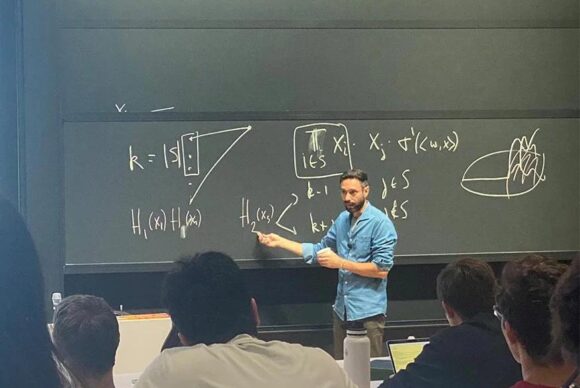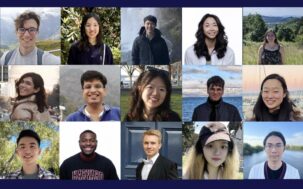Kempner Institute Hosts Seminar Series Focused on the Basis of Intelligence

Emmanuel Abbe discusses the reasoning capabilities of neural networks and transformers and how to improve them at a Kempner Seminar Series talk on October 13, 2023. Photo by Aman Kaleem.
Cambridge, MA – The Kempner Institute for the Study of Natural and Artificial Intelligence at Harvard is pleased to introduce the Kempner Seminar Series, a research-level seminar series that covers topics related to the basis of intelligence.
The series, now organized jointly by the Kempner Institute and Harvard’s ML Foundations group, incorporates and builds upon the former ML Foundations seminar series, and features prominent, cutting-edge researchers who study the basis of intelligence in natural and artificial systems, with specialties ranging from machine learning to neuroplasticity.
“This is a great opportunity to expand on our machine learning foundations seminar to explore not just artificial intelligence but also natural intelligence and the connections between the two,” said Boaz Barak, an associate faculty member at the Kempner, who founded and co-leads the Harvard ML Foundations Group.
“We are thrilled to partner with Harvard’s ML Foundations group to build upon their work bringing cutting-edge speakers to Harvard,” said Elise Porter, Executive Director of the Kempner. “Working together, we are building a program that gives students, researchers and faculty the opportunity to hear from and meet with innovative experts leading advancements in intelligence research.”
The Kempner kicked off the seminar series on September 9 with a talk about dataset security issues in generative AI by Tom Goldstein, Perotto Associate Professor of Machine Learning in the Computer Science Department at the University of Maryland. On September 15, Denny Zhou followed with a talk entitled “Teaching Language Models to Reason.” Zhou, who founded and leads the reasoning team at Google DeepMind, discussed the critical need for reasoning in machine learning and advancements in large language models (LLM) reasoning that show promise in narrowing the gap between human intelligence and machine learning.
The series hosted its third talk of the year on October 13, with Emmanuel Abbe, Chair of Mathematical Data Science at Ecole Polytechnique Fédérale de Lausanne, presenting on “Logic reasoning and generalization on the unseen.”
This year’s upcoming speakers in the series include experts from academia and industry, including Kim Stachenfeld, Eric Shultz, Tom Griffiths, Stefano Ermon, and Ev Fedorenko. The Kempner Seminar Series is held on Fridays and is open to the public.
About the Kempner
The Kempner Institute seeks to understand the basis of intelligence in natural and artificial systems by recruiting and training future generations of researchers to study intelligence from biological, cognitive, engineering, and computational perspectives. Its bold premise is that the fields of natural and artificial intelligence are intimately interconnected; the next generation of artificial intelligence (AI) will require the same principles that our brains use for fast, flexible natural reasoning, and understanding how our brains compute and reason can be elucidated by theories developed for AI. Join the Kempner mailing list to learn more, and to receive updates and news.
PRESS CONTACT:
Deborah Apsel Lang | (617) 495-7993 | kempnercommunications@harvard.edu






